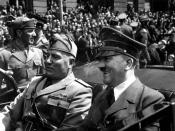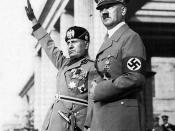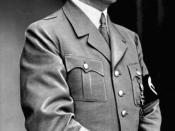For most people, the name Adolf Hitler represents the darkest, most abominable possibilities of human nature. Yet in just seven years of dictatorship, he occupied the vast majority of Europe including Poland, Czechoslovakia, Austria, Hungary, Belgium, and even France. What were the reasons for Hitler's success? Hitler was successful during the early part of the war because he was a military genius, he eliminated his opposition, and knew how to use propaganda to please and impress people with whom he wanted support.
Hitler was a military mastermind. He paid a lot of attention to military research and the selection of the military equipment. Since the majority of Germany's conquests were on land, Hitler invested enormous amounts of money into tanks, and to support the invasion he also supplied a huge fleet of bombers. To hold off sea and air attacks, Hitler equipped his military with hundreds of anti-ship submarines, which destroyed the opposition's fleet ships and supply ships, and fighter planes to clear the air for bombers.
Hitler also developed a tactic which was very successful: he combined two or more armies to attack together, for example in air-and-land warfare, bombers would bombard his target, then tanks and infantry would be sent in to completely eliminate any other resistance. This approach worked well because with coordinated, multi-angled attacks Hitler's armies had an advantage over those opposing him. Hitler also employed the Blitzkrieg (German: "lightning war") method of fast-moving, mechanical air-and-land warfare. In a blitzkrieg, tanks and troop-transport vehicles were concentrated and massive attacks were made by dive-bombers to break through opposing forces and penetrate far behind their lines.
"Poland was overrun by German... armies in just three weeks. The Poles fought bravely, but they were helpless against the new style of warfare, the Blitzkrieg which the German armies had developed,



Political factors yes. But where are the economical factors?
I agree a lot with your pointers. However, there are quite a number of other factors that led to Hitler's rise.
Namely, the Great Depression. Hitler was first able to rise, and continue to garner support. The great depression hit Europe and USA pretty badly at their faces. The rich were reduced to beggars, and the middle-class were reduced to the status of their slaves. Because of this, many were desperate. They had no food and were starving. Hence, they blamed the Reichstag for being negligent towards the situation.
Hitler was intelligent enough to use this as an advantage to rise. His Nazi Party was previously receiving no more than 10% of the votes from elections. However, after he used his propoganda by saying he'd provide food and water, the people gained faith in him.
2 out of 2 people found this comment useful.